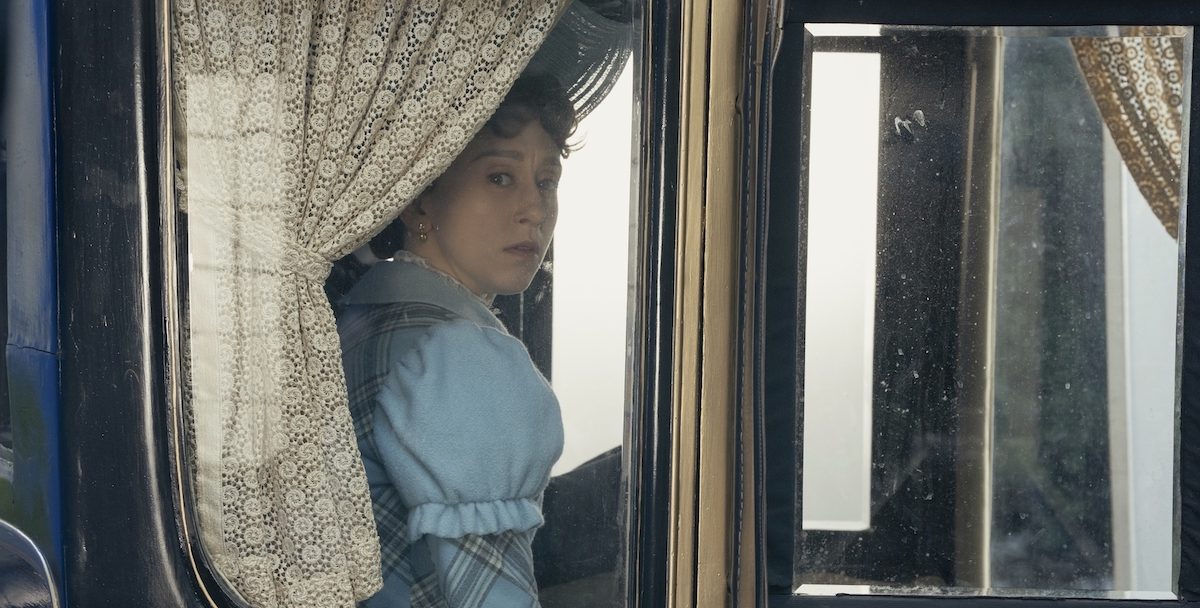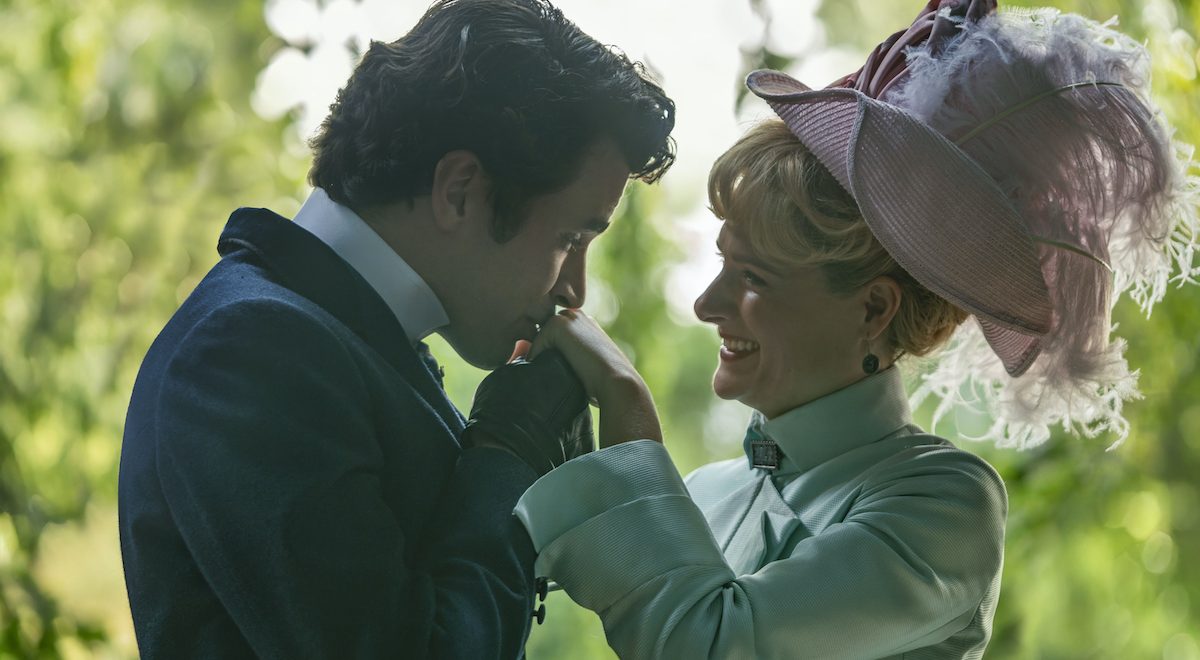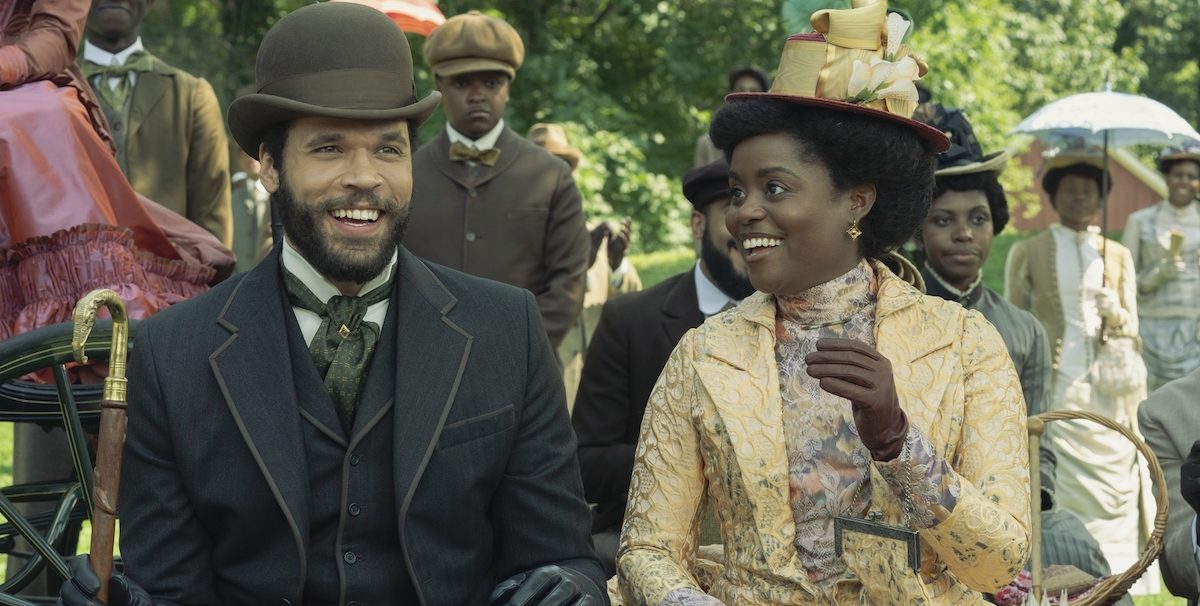Crossing its mid-mark, the third season of HBO’s ‘The Gilded Age’ revs up the tension as the Russells continue to struggle while others around them deal with gossip and drama in their own ways. Following Gladys’ wedding to the Duke, the episode picks up with her in England, trying to learn the ways of her new life. Meanwhile, her mother finds a new cause to support while also struggling to reconnect with her husband, who has enough worries of his own. SPOILERS AHEAD.
Gladys Struggles to Find a Place in Her New Home
It has been a while since Gladys boarded the ship from New York with her husband, the Duke of Buckingham. Now she is in the estate, of which she is the Duchess. The sprawling nature of the place takes her by surprise. So does the enthusiasm of the people who greet her. However, she does not find the same welcoming nature in Lady Sarah, who keeps the reins of the place tightly in her hands. She claims to want to turn Gladys into an English Duchess, but it doesn’t look like she is interested in actually teaching her anything or making her life any easier.

Lady Sarah pays no attention to Gladys’ questions and responds rudely when picking at her lack of knowledge. At dinner, she chides Gladys for not wearing diamond stars and not a crown, which she is supposed to as a Duchess, and her behaviour continues to be abysmal throughout the meal. The only comfort that Gladys has is her maid Adelheid. However, after the dinner, Lady Sarah decides to do away with her. The original plan was to keep her until she could train an English maid. But now, Lady Sarah believes that she is not in that position. However, instead of discussing it with Gladys, she decides to dismiss Adelheid herself. When Gladys tries to stand up for her maid, she, too, is dismissed in a way. This leads her to finally write a letter back home.
George Delegates an Important Opportunity to Larry
Since the beginning of the season, George has been intent on his railway project, which has been deemed too risky by a lot of people. In the previous episode, JP Morgan and the other investors pulled out of the project, leaving George to work with his own money. However, that is not enough, which Mr. Clay reiterates for the umpteenth time. At this point, George is fighting a battle on two fronts. On one side, he needs the mines of Morenci, which the owners are not ready to sell because this is the only thing they have. On the other side, he needs the Merricks to sell him their shares so that he can have control over the Chicago line, allowing him to continue with his schemes.

When Mr. Clay fails to make these things work, George decides that it’s time for the old man to take his leave. Instead, he turns the attention to Larry, who has shown exceptional business acumen by investing in Jack’s watch. George asks him to go to Morenci and sort out the situation. While Larry agrees to do it, he also asks his father what’s in it for him. This catches George off guard, but he is glad to see that his son is just as ruthless as he is when it comes to business. Still, he points out that should the deal work, everything will eventually go to Larry, so it is of utmost importance that the deal works out.
George wants Larry to leave at once, but the younger Russell reveals that he plans to ask Marian Brooks to marry him. George is happy to hear this, and when Larry wonders if Bertha will approve of it, his father assures him that he will take care of his mother and her disapproval. He doesn’t wish to repeat the same mistake he made with Gladys. A giddy Larry seeks out Marian, takes her to the park, and then asks her hand in marriage. As expected, she accepts, and the couple immediately goes to her aunts to reveal the news. While Ada is overjoyed, Agnes feels as if Marian had not been truthful with her about her feelings. But that’s not the only thing she feels offended at.
Larry Meets a Familiar Face
When Larry mentions that Jack’s clock has been sold and he is incredibly rich now, Agnes becomes angry that this was kept a secret from her. While the part about the clock is revealed, no one, except Mrs. Bauer, yet knows about how much he actually made out of it, and Agnes would like to know about it. Church and Armstrong find out about it when Mrs. Bauer accidentally lets it slip. Meanwhile, Jack goes to the Haystack, an establishment where people with money can spend their evening however they want. While the newly rich footman becomes familiar with the place, Larry notices Maud Beaton in the crowd. When he tries to talk to her, she dismisses him and claims to be someone else.

The next morning, after saying goodbye to Marian, Larry tells Oscar about seeing Maud, which makes the latter wonder if he should confront her. However, John points out that she has already received her due if she is working at the Haystack and not enjoying the spoils of her last con, and Oscar should stay out of it. Meanwhile, at the Russell household, Mrs. Bruce and Mr. Borden talk about her husband. She reveals that despite the years of their separation, she still loves him in a way, though she believes that he might not love her back the same. When Mr. Borden tells her that he loves her, she says she is grateful to him for it.
While everyone else is busy starting a new chapter of their lives, Ada still grieves for her husband. Despite her sister’s disapproval, she goes to see the medium again. This time, she takes her husband’s watch. The medium tells her that her husband wants her to be happy and live her best life for as long as she is alive. She also slips other details which might come off as generalisations to others, but are a confirmation for Ada that the medium is, in fact, in touch with her husband’s spirit. When she returns home, she declares that she is ready to wear colors again.
Peggy’s New Job Opportunity Opens Old Wounds
Peggy’s connection with Dr. William Kirkland goes strong as the duo attends a baseball match. Despite her father being the patron of one of the teams, this is the first time Peggy has attended a game, and she is happier for it. She has a great time with her suitor, but then, she spots Mr. Fortune in the crowd. While she tries to evade him, he seeks her out. Their interaction gives off weird vibes, which William does not miss. Mr. Fortune congratulates Peggy on her novel, and because she is such a great writer, he offers her a job opportunity. There is a suffragette in Philadelphia whom Fortune believes Peggy should interview.

At first, Peggy is hesitant to take the job, mainly because of the complicated nature of her and Fortune’s relationship. However, William encourages her to pursue it, and she decides to ignore the issues with Fortune. When she reveals this to Agnes, she wonders if it will interfere with her novel. Marian, on the other hand, asks if it is wise for her to travel to Philadelphia for a job that Mr. Fortune has given her. Peggy is not worried because this isn’t like the last time. She is going to Philadelphia by herself. Or so she thinks.
When she arrives at the station, Mr. Fortune is there too. He reveals that he changed his mind about letting her go alone and will be joining her. This does not sit well with her or William, who is there to drop her off. When he asks Fortune to back off, the latter takes offence at his words and attacks William. Peggy breaks it off before things can get worse. She makes it clear that either she goes alone or she does not go at all. With this, Fortune takes his leave, while William promises her that he will be there when she gets back.
Cracks Widen in Bertha and George’s Marriage
While Bertha obsesses over finding the spy in her house who is feeding all the information about their private stuff to the news, George gives her a new assignment. While he has tasked Larry with the Morenci situation, he needs to handle the Chicago problem himself. He asks Bertha to arrange a dinner with Alfred Merrick, and she happily obliges. George’s plan was for his wife to lure the target so that he could make his move. But at the dinner table, he notices a flirtatious tone between Merrick and Bertha. If this wasn’t enough to make him angry, Merrick refuses to consider his deal, which makes the whole dinner thing a pointless exercise. At the same time, Bertha disapproves of Larry’s decision to marry Marian, but George stands his ground. He also calls her out for flirting with Merrick, but she refuses to bear the blame for his loss to secure the deal.

Moreover, when she discovers that Clay has been fired, she becomes concerned about how the business is doing, but George is too angry with her to talk about it. He dismisses her rudely while she leaves for Newport. There, she attends Mrs. Fish’s luncheon party, where Aurora had been invited because the host thought Mrs. Astor wouldn’t make the effort to come all the way to Newport with all the gossip surrounding her daughter. However, it turns out Mrs. Astor intends to use Aurora’s misfortune as an opportunity to take the spotlight away from her. Her presence at the party means that no one is ready to touch Aurora with a ten-foot pole, but Bertha disagrees with her approach. She is so vehement in her support for her friend that she declares that she will leave if Aurora is not allowed to sit at the table.
But then, Marian steps in and decides to join her cousin as she leaves for home. While Aurora agrees to leave, it disturbs her. Even though she is going to get all the houses as part of the divorce deal, she will lose all the friends she had because she was Mrs. Charles Fane. When the party ends, Mrs. Fish warns Mrs. Astor that she shouldn’t ostracize Aurora, considering that her daughter’s marriage is headed the same way, something that she is not ready to accept. Meanwhile, as Bertha reaches home, she still thinks about how Aurora was treated by everyone. Before she can actually think of doing something about it, George shows up with Gladys’ letter. He is enraged that their daughter is miserable and blames Bertha for it. While she says she will go to England and fix things, George doesn’t seem so convinced by it. He also tells Bertha not to expect him at home when she gets back from England.
Read More: Shows Like The Gilded Age


